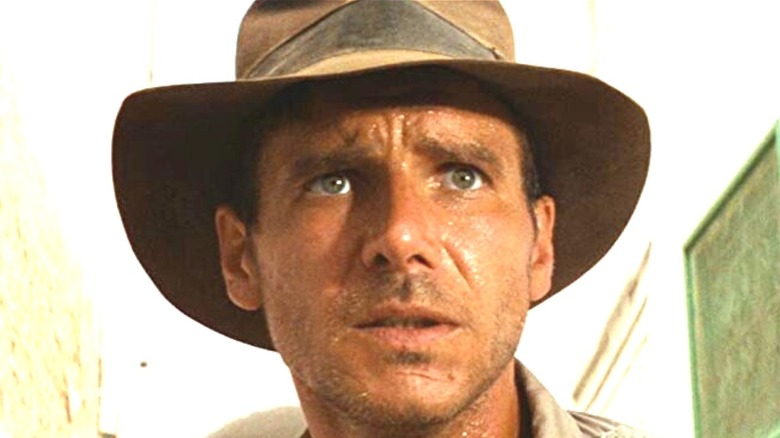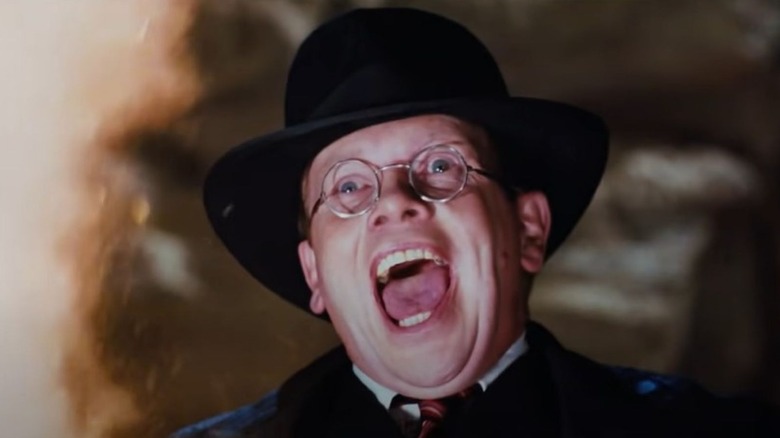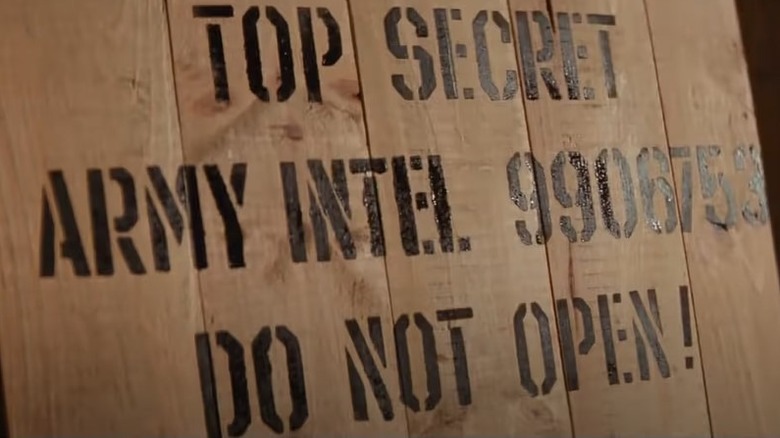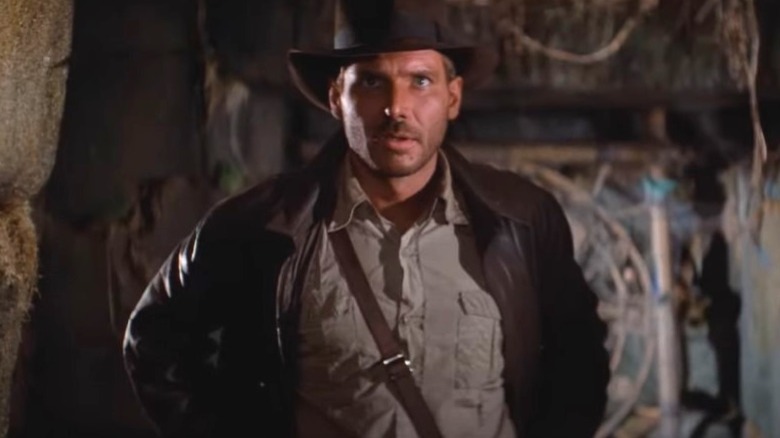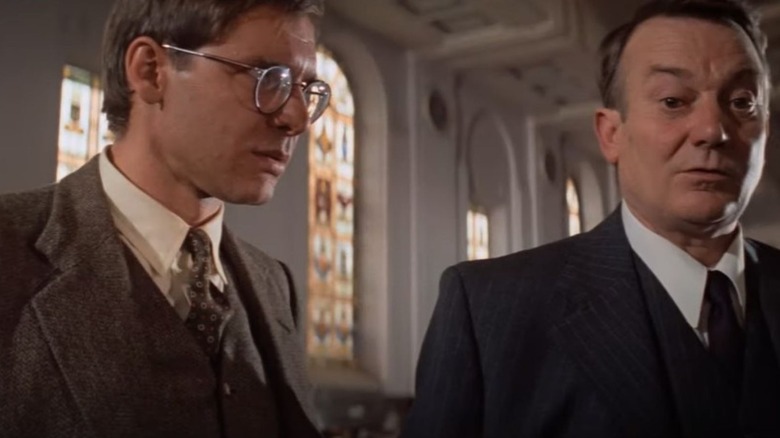The Ending Of Raiders Of The Lost Ark Explained
Few cinematic heroes are more recognizable than grizzled, fedora-wearing Indiana Jones (Harrison Ford). From the moment of his debut on the big screen in 1981 with "Raiders of the Lost Ark," Jones established himself as a hero for the ages, spawning three sequels, novels, and a TV series. Per IMDb, "Raiders of the Lost Ark" won five Academy Awards: best art direction-set decoration, best sound, best film editing, best visual effects, and the special achievement award for sound effects editing. The film also landed nominations for best picture, best director, best cinematography, and best music, original score (if there were an Academy Award for best theme song of all time, this would be on the short list, right?).
By the time we meet Indiana Jones in "Raiders," he is already an experienced leather-jacket-and-fedora-clad adventurer and archaeology professor. The film begins with museum curator and long-time friend Marcus Brody (Denholm Elliott) bringing government agents to see Indy at Marshall College. From an intercepted communiqué, they deduce that the Germans are searching for the Ark of the Covenant, an ancient biblical artifact believed capable of rendering the Nazis invincible. Indy, along with friends Marion (Karen Allen) and Sallah (John Rhys-Davies), set off on an adventure to find the Ark before the Nazis. Gunfights, truck chases, and a terrifying snake pit bring the film to an explosive ending in the desert.
Did Indiana Jones have any impact?
"Raiders of the Lost Ark" ends with the Nazis getting their hands on the Ark and opening it, only to see its contents lay waste to the entire battalion. Interestingly enough, everything that happened with the Ark seemingly would have occurred whether Indiana Jones was involved or not, the only possible exception being that, without his interference, Marion may have been killed by the Nazis. However, "Raiders of the Lost Ark" isn't a film about the journey of the Ark of the Covenant; it's a film about the journey of Indiana Jones.
Jones is an educated man, a man of history. He isn't one to believe in the supernatural powers of God. In the scene when he first meets the "G-men," he says, "if you believe in that sort of thing." This film is about Indiana Jones discovering that his grasp of history can't explain everything. Brody warned him at the beginning, "It's like nothing you've gone after before." "Raiders of the Lost Ark" turns out to be the journey that sets up his openness to the possibility of a malevolent force in "Temple of Doom," the power of the Holy Grail in "Last Crusade," and interdimensional being in "Kingdom of the Crystal Skull."
Why did the government lock the Ark away?
Why did the government go to such lengths to get the artifact, only to pack it away in a nondescript crate in an unnamed warehouse? The idea that Jones returned from the desert with a fantastic story of Nazis' faces melting from their skulls from being exposed to the power of God likely would have ended with a straightjacket. Jones may have kept the story to himself, realizing that the tremendous power of the Ark could be abused by leaders to gain world domination while killing countless people. The Ark being placed in the warehouse to be forgotten forever is the best outcome given the circumstances.
Another possibility is that Jones and Brody told the agents the entire story and they simply didn't believe them. In the final scene, Brody asks the agents where the Ark is, noting its "unspeakable power," only to get the answer that top men are working on it. When Indy presses to find out who, the response given is, "Top. Men," which seems like a typical answer from the U.S. government. The agents most likely couldn't or wouldn't believe the fantastic story told by the two men, so they respond with deflection.
In either case, the government went back on its deal with Marcus Brody that the Ark would be given to the museum in exchange for Indy keeping it out of the hands of the Nazis.
Indiana may be very familiar with the Bible
One question viewers were left with at the end of the movie concerns Indy's knowledge. Forget the sheer force of will it must have taken a lifelong archaeologist to look away from the greatest discovery in the history of archaeology — how did he even know he had to do so? The answer to that question lies in the novelization of the film. In the film, there is a scene where Indy and Sallah are speaking with an imam about a headpiece required to determine the Ark's location. When the imam translates it for them, they learn that rival archaeologist René Belloq (Paul Freeman) is digging in the wrong place. In the novelization, there is further information that the imam tells the adventurer that no mortal should gaze upon the Ark's contents (via Screen Rant).
Without the novel, Indy's knowledge not to look into the Ark could be explained by his potentially having spent plenty of time reading the Bible. During what would otherwise have been his last moments, Indy must have dug deep into his memory and recalled a scripture from his childhood (or he studied all the texts about the Ark before he left like a good scholar would), 1 Samuel 6:19. "But God struck down some of the inhabitants of Beth Shemesh, putting seventy of them to death because they looked into the ark of the Lord. The people mourned because of the heavy blow the Lord had dealt them."
Raiders set him up to be a father
Because this is a journey not of the Ark of the Covenant but of Indiana Jones, we see the impact that the events of this story have on the rest of the franchise. We see Indy discover that the power of God is real and that the events depicted in the Bible can be more than myth or legend. In "Temple of Doom," Jones learns his father disappeared searching for the Holy Grail, sparking another adventure in search of God's power. Although there was initially tension between the two, Jones having never understood his father's obsession with the Grail, now that he has seen the power of God, he finds himself "giddy as a schoolboy" once he is on the trail.
Another life-changing impact "Raiders of the Lost Ark" had on Jones is that it made him a father himself. In this film, he was reunited with Marion Ravenwood, rekindling a long-lost love. Not long after, however, Jones leaves her, believing he wouldn't be a good husband due to the long absences his job required. Little did he know, Marion soon gives birth to their son, Mutt (Shia LaBeouf), whom he meets years later in "Kingdom of the Crystal Skull." Without his adventure with Marion in "Raiders of the Lost Ark," Mutt would never have been born.
